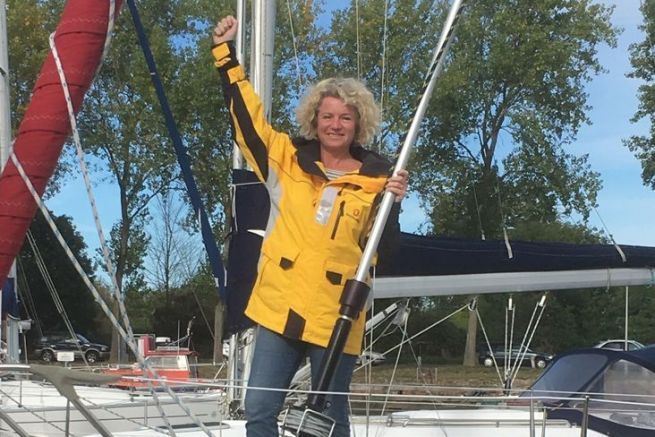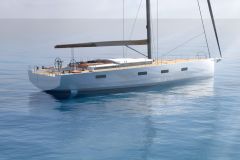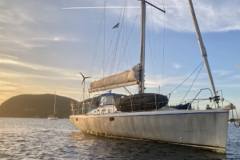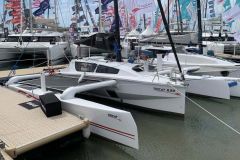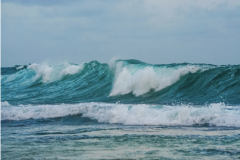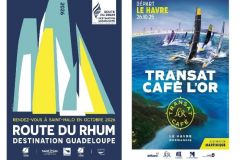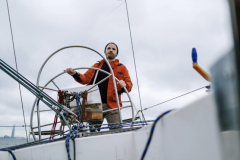We like boat passengers who, when asked, "What do you think?" Boater or boater's wife? " answer straight out, like Catherine: " Above all, I'm a boater! "

Catherine is 52 years old, 2 children, chartered accountant. She has always lived in Caen until her remarriage in 2003. She was scared to death of the sea until then. Since May 2019, she sails around the world with her husband François on Storia Storia, a UFO 455. A place she wouldn't leave for anything in the world.
First contact
However, it had not all started under the best auspices. " In 2003 ", explains Catherine, " i'd never set foot on a boat before. François offered me the chance to take a seat on a catamaran, accompanied by around ten other people, to sail around the Lesser Antilles. In my head, I could see myself sipping cocktails on the deck of a splendid sailing boat, light breeze and sunshine, the ship gliding on the wave with the wind. The least that can be said is that I was shocked when I saw my husband, at two o'clock in the morning the first night, going out to take a reef in the middle of a squall. And to see him come home happy and joyful, when I had been scared to death, made me doubt his sanity. For me, there was no such thing as a boat at night. I had no awareness of sailing at night."
" They're all crazy! We live with people who don't have the same perception as Earthlings. "It is with this image in mind that the future yachtswoman returns to dry land.
And the rest won't be to reassure her. A few weeks later, her husband announces her to rent a small 6.50 m sailing boat to go from Dielette to Chausey, in the English Channel. " A small, tiny little crossing ", he tells her. It's forgetting the aptly named passage of the Rout and its well-known currents. " Road going, could have been fine ", before adding, for the rhyme, "But road back, help!" [Laughter] Because that's one of Catherine's qualities, this constant good humor. " The boat's tilting, it's going to fall! "The navigator will discover the lodge, in panic and stress.
Training and mooring in Brittany
Years go by, and one sailing trip follows another: in Brittany and Normandy. Then further on the Northern Channel, the English coasts. Catherine will moor and becomes addicted. She and her husband set up a project to sail around the world. She wants it to be their project together.
Buying the boat, getting it ready... The yachtswoman has her place on board. " He's still the boss, because there only has to be one, but I like sailing. I want and need to be part of the sailing. I like crossings, changing anchorages and moving around. The journey is as important as the destination to me, I want to have my responsibility on board. I'm the official helmswoman, I'm in charge of all the manoeuvres ."
She explains to us " I don't see a symbol in traveling. I think that the notion of crossing an ocean, passing a cape or crossing the Panama Canal are very masculine symbols of travel, to which women are not sensitive. Ideally, for these long crossings, I would like to fall asleep on the second day and wake up the night before, just when I need to get back to being active on board. A lot of women love life on board and hate sailing. I'm not the other way around, I like living on the boat, but it's navigation above all that I'm looking for. "
And to conclude, on the passages: " The man is an adventurer, the woman is more of a homebody. It's been that way for hundreds of years, it will be difficult to change these codes.. ".
Looking for discoveries

Speaking of destinations, Catherine explains: " Each new anchorage is a discovery, a pleasure. I love arriving in new places. We're lucky to see that. You're never disappointed when you get somewhere. You're on a boat, you can go where you like. If we don't like a place so much after a few hours on the spot, all we have to do is weigh anchor and go somewhere else. François and I have an approach to boating that seeks ease and pleasure above all. "She also reassures: " In general, we are on the same wavelength, if I don't like a place, I don't like it either, and vice versa. "
Travelling as a couple?
" You have to be in phase when you set off as a couple: way of sailing, frequency of stops, stages, sleep rhythms of each other. You have to leave for the right reasons, your own. Especially not to please an insistent boating spouse. I've seen so many couples tear each other apart once they reach the West Indies. A boat is promiscuous. Sometimes bad weather creates tension. All this can exacerbate latent situations. So you have to be sure you want to go with your husband, of course, but for your own journey, not for the other's. "
A look at containment

Catherine and her husband spent their confinement at anchor on Forked Island near St. Bartholomew. " On the boat, I cheer François up when he's feeling a little slack. He came to sail and suddenly finds himself banned. I understand his difficulty. This confinement has been a time for walking, swimming and fishing. We had two phases: Concern at the beginning with the fear of this epidemic of course and fear of not knowing how to manage this relative deprivation of liberty. We were afraid of being bored. Then the rhythm changed. We got up a little later each day and restricted our activities by ourselves, concentrating on the essentials. Of course, the loss of freedom of movement is not a pleasant feeling, but our confinement and the place we were then in were far from what some people could experience. So it's a pretty good memory, not a pain. "She concludes:" And it made François think of going to live like Robinson Crusoe on a desert island, something I knew I couldn't bear. Confronting your dreams can reconnect you to reality." [Chuckles again]
What does a sailor on a boat lack?

" Definitely nothing material. We have everything we need to live on board. It's the social bond I long for. We have a lot of boat friends that we meet once or twice and may never see again. It's complicated to create long-term, deep relationships on the water. We only have one couple of friends, also from Caen, who were boat friends at first and became real friends later on. "
What about family relations?
" New technologies are a great tool for staying in touch, but a Skype or WhatsApp call doesn't get the thrill out of it. I'm a mom, I need to touch my kids. Remotely and via a screen, we inevitably filter emotions, we unconsciously self-censor ourselves. "she explains.
Any advice?
The yachtswoman explains to us " I would recommend to a yachtswoman to know what she's going on this trip for. If it's not for her, if it's just to follow him, she might be disappointed. Might as well let her husband go with friends who are more inclined to do so. For all pleasure boaters, my advice is to live things to the fullest by being in the moment. Put your worries ashore when you get on board and take your time. Always do. Never want to go faster than the music to avoid mistakes. Also know how to play elbows with the skipper to impose yourself as a full-fledged crew member. To know what you can bring to him and how you can help him, it's important to have a clear division of roles on board before you start." She explains. " If the skipper is a companion or a relative, use this skill that we women have to cheer up and be more optimistic, often, than these gentlemen. They need us on the water! "
Catherine and her husband's boat is currently being refitted in the West Indies. She makes her impatience clear when we ask her. " In a hurry to get back, Catherine? " " If the weather was good there and I was offered a plane ticket, I'd be on board tomorrow!". Unfortunately, the current situation with the health crisis is what it is. We have to wait for events and decisions. Everything changes quickly, very quickly. We have to be patient and attentive right now. "
Making compromises for the couple
Speaking of two-handed navigation, there are probably compromises on either side of the boat. Catherine explains. " The step I want to take that François doesn't want: Los roques, in Venezuela. He sees it as a detour on the one hand, and a risk of piracy on the other. Here again, no stress or pressure. The decision is explained and clear. We don't do it now, we'll do it another day."
In conclusion, the now experienced navigator adds, "I'm not sure what to say I learned to sail in the English Channel and Brittany. Wherever I went, I couldn't find the same sea conditions anywhere. As cut, hard and violent. Nowhere is there such a tidal range, such a current. You can feel, when you come across them, the sailors trained in the English Channel and those trained in the Mediterranean don't have the same behaviour or the same words. Passing the Raz Blanchard with 4-metre rear waves puts into perspective what it is like to be a boat that moves... "
And Catherine bursts out laughing, once again.
Catherine and François plan to go back to sea around November or December 2020. Let's wish them, both of them, good quarters!
